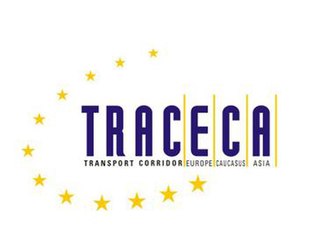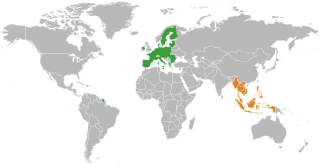
Turkmenistan's declaration of "permanent neutrality" was formally recognized by the United Nations in 1995. Former President Niyazov stated that the neutrality would prevent Turkmenistan from participating in multi-national defense organizations, but allows military assistance. Its neutral foreign policy has an important place in the country's constitution. Although the Government of Turkmenistan claims to favour trade with and export to the United States, and Turkey, its single largest commercial partner is China, which buys the vast bulk of Turkmen natural gas via the Central Asia–China gas pipeline. Turkmenistan has significant commercial relationships with Russia and Iran and growing cross-border trade with Afghanistan. The Government of Turkmenistan often appears to use the conflicting interests of these regional powers as a means to extract concessions, especially on energy issues.

The United Nations Economic Commission for Europe is one of the five regional commissions under the jurisdiction of the United Nations Economic and Social Council. It was established in order to promote economic cooperation and integration among its member states.

The Council of the Baltic Sea States (CBSS) is a regional intergovernmental organisation working on three priority areas:

The Central Asia Regional Economic Cooperation (CAREC) Program is a program established in 1997 by the Asian Development Bank (ADB) to encourage economic cooperation among countries in Central Asia and nearby parts of Transcaucasia and South Asia.

The European Structural and Investment Funds are financial tools governed by a common rulebook, set up to implement the regional policy of the European Union, as well as the structural policy pillars of the Common Agricultural Policy and the Common Fisheries Policy. They aim to reduce regional disparities in income, wealth and opportunities. Europe's poorer regions receive most of the support, but all European regions are eligible for funding under the policy's various funds and programmes. The current framework is set for a period of seven years, from 2021 to 2027.

The Energy Community, commonly referred to as the Energy Community of South East Europe (ECSEE), is an international organization consisting of the European Union (EU) and a number of non-EU countries. It aims to extend the EU internal energy market to wider Southeast Europe. The members commit to implement relevant EU energy acquis communautaire, to develop an adequate regulatory framework and to liberalize their energy markets in line with the acquis under the founding Treaty.

The inaugural session of the Black Sea Forum for Partnership and Dialogue (BSF) was held on June 4–6, 2006 in Bucharest. The Forum is a Romanian initiative, initially meant to hold annual presidential-level summits and thematic or sectoral-cooperation meeting during those annual intervals. The Forum is not meant to create new regional institutions, but rather to turn into a regular consultative process among countries of the extended Black Sea region and between this group of countries and international organizations such as the European Union. After the inaugural summit, no other summits were planned.
Interreg is a series of programmes to stimulate cooperation between regions in and out of the European Union (EU), funded by the European Regional Development Fund. The first Interreg started in 1989. Interreg IV covered the period 2007–2013. Interreg V (2014–2020) covers all 27 EU member states, the EFTA countries, six accession countries and 18 neighbouring countries. It has a budget of EUR 10.1 billion, which represents 2.8% of the total of the European Cohesion Policy budget. Since the non EU countries don't pay EU membership fee, they contribute directly to Interreg, not through ERDF.
The Baku Initiative is an international initiative of the European Union. It is a policy dialogue on energy and transport cooperation between the European Union, Turkey, and the former Soviet republics, undertaken as part of the INOGATE energy and TRACECA transport programmes.

Although the European Union has legislated, set targets, and negotiated internationally in the area of energy policy for many years, and evolved out of the European Coal and Steel Community, the concept of introducing a mandatory common European Union energy policy was only approved at the meeting of the European Council on October 27, 2005 in London. Following this the first policy proposals, Energy for a Changing World, were published by the European Commission, on January 10, 2007. The most well known energy policy objectives in the EU are 20/20/20 objectives, binding for all EU Member States. The EU is planning to increase the share of renewable energy in its final energy use to 20%, reduce greenhouse gases by 20% and increase energy efficiency by 20%.

TRACECA is an international transport programme involving the European Union and 12 member states of the Eastern European, Caucasus, and Central Asian region. The programme aim is to strengthen economic relations, trade, and transport in the regions of the Black Sea basin, South Caucasus, and Central Asia. It has a permanent Secretariat, originally financed by the European Commission, in Baku, Azerbaijan, and a regional office in Odessa, Ukraine. Since 2009, the organization has been entirely financed by member countries.

The Republic of Azerbaijan and the European Union (EU) have maintained a positive relationship through the years and have become more closely linked since 1991. Azerbaijan is currently part of the European Neighborhood Policy, the Eastern Partnership and the Council of Europe. The EU is the largest foreign grant donor to and investor in Azerbaijan, both in the government sector and civil society, making available over 600 million EURO of bilateral EU assistance since 1992.

The ASEAN–European Union relations are the bilateral foreign relations between the two organisations; the European Union (EU), and the Association of South-East Asian Nations (ASEAN). EU and ASEAN have been interacting with each other on the economic, trade, and political levels for more than four decades. The partnership between the EU and ASEAN dates back to 1972, when the EU established ties with ASEAN. The EU became an ASEAN Dialogue Partner in 1977.

The Union for the Mediterranean is an intergovernmental organization of 43 member states from Europe and the Mediterranean Basin: the 27 EU member states and 16 Mediterranean partner countries from North Africa, Western Asia and Southern Europe. It was founded on 13 July 2008 at the Paris Summit for the Mediterranean, with an aim of reinforcing the Euro-Mediterranean Partnership (Euromed) that was set up in 1995 as the Barcelona Process. Its general secretariat is located in Barcelona, Catalonia, Spain.
The Alpine Space Programme is a transnational cooperation programme in the framework of the European Union cohesion policy. In this programme national, regional and local stakeholders from the participating countries in the Alpine space cooperate on various transnational projects.

Energy in Moldova describes energy and electricity production, consumption and import in Moldova.

European Union–Kazakhstan relations are the international relations between the Republic of Kazakhstan and the common foreign policy and trade relations of the European Union.
The European Neighbourhood Instrument (ENI) came into force in 2014. It was the financial arm of the European Neighbourhood Policy, the EU’s foreign policy towards its neighbours to the East and to the South. It had a number of programmes. In 2021 ENI was merged into the new organization Global Europe.

The EU Centres of Excellence on Chemical, Biological, Radiological and Nuclear Risk Mitigation is an initiative of the European Union which was launched in 2010. The Initiative addresses the mitigation of and preparedness for risks related to CBRN material and agents. The origin of these risks can be criminal, accidental or natural. The CBRN CoE Initiative seeks to boost cooperation at national, regional and international levels, and to develop a common and coherent CBRN risk mitigation policy at national and regional level. Risk mitigation comprises prevention, preparedness and post-crisis management.
ASEAN Center for Energy (ACE) is an intergovernmental organisation within the ASEAN structure that addresses the interests of 10 ASEAN Member States (AMS) in the energy sector. ACE was established on first January 1999. The organisation assumes a focal job in the ASEAN energy sector. It works intimately with energy specialists/services in the 10 AMS called the Sub-sector Networks (SSN) and the Specialised Energy Bodies (SEB) and with the ASEAN Secretariat, which goes about as the overseer and director of the Endowment reserve. Together, they carry out the ASEAN Plan of Action for Energy Cooperation (APAEC), a blueprint for better collaboration towards upgrading energy. Keeping the region's improvement, sustainable and harmless to the ecosystem is a fundamental concern of ASEAN's energy sector. This concern is shared as a typical subject of each Sub-sector Network in executing its programmes. The executive director is Dr Nuki Agya Utama.














